Photo by the author, Deeann D. Mathews at Lloyd Lake, February 16, 2024
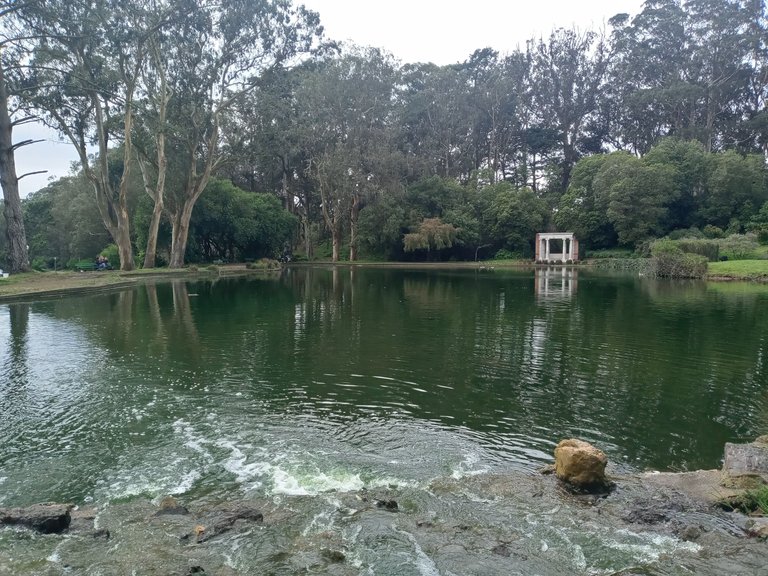
Maybe it is because I've known there is a time portal at Lloyd Lake in Golden Gate Park ever since my grand old soldier pointed it out to me 12-15 years ago.
Maybe it is because I just HATE loose ends, and an extra day on Black History Month means I'm especially in the thought of "Believe I'll run on, see what the end is gonna be" ESPECIALLY since my grand old soldier loves and used to sing in male groups like this:
BUT THE THING IS, I just can't leave Wagner's least-known hero where he is, mourning in 12th-century Cornwall over Tristan and Isolde. In audio only, Kurt Mōll still broke the fourth wall: he made King Marke's agony all too real. There is no way in real life that I could hear anyone going through that and leave that person alone. I'm just not built like that, especially when the means exist to solve the problem, for I know what should have happened in Cornwall after the curtain closed:
Blessed are they which mourn, for they shall be comforted. Blessed are they which do hunger and thirst after righteousness, for they shall be filled. Blessed are the merciful, for they shall obtain mercy. Blessed are the peacemakers, for they shall be called the children of God.
And then, history lets me wedge myself in because of the Christian history of Ethiopia. Presuming that Christians at that time were making pilgrimages to Jerusalem from both Africa and Europe while the Crusaders ruled Jerusalem, that would leave a space for King Marke to have perhaps met an Ethiopian queen there some decades before Tristan und Isolde -- and therefore news of him might pass to her, and vice versa, later.
So, as the Jackson Southernairs have said it, we shall have to run on and see what the end is going to be.
Through the portal I walked ...
Photo by the author, Deeann D. Mathews at Lloyd Lake, February 16, 2024
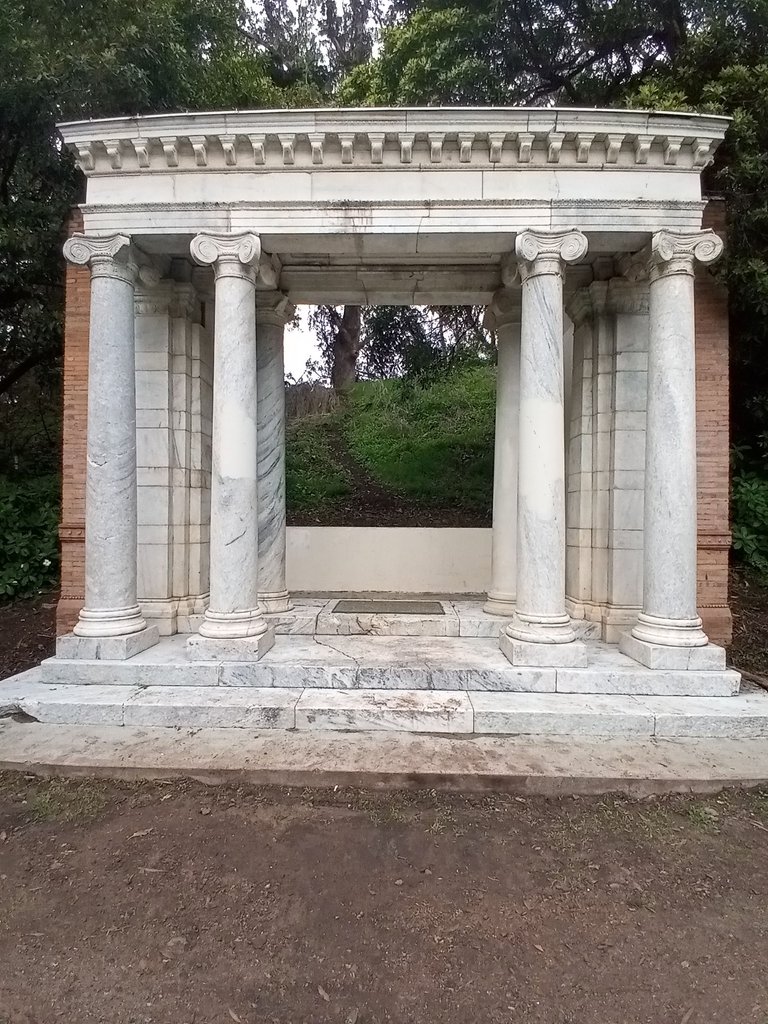
... first back through 1906, the actual date of this archway that survived the 1906 quake in San Francisco and was later donated to Golden Gate Park...
Photo by the author, Deeann D. Mathews at Lloyd Lake, February 16, 2024
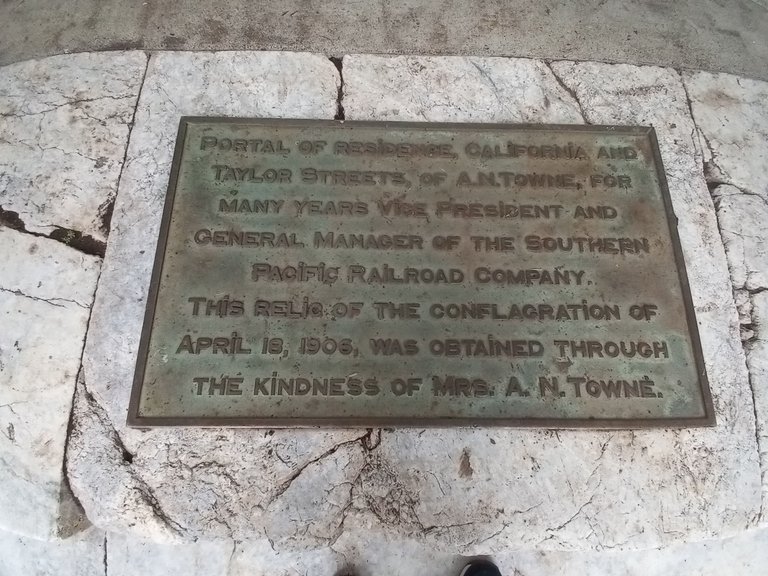
... and landed aboard ship as Queen Sheba, my courtiers all around me in my quarters.
"Kandace and Qore," they all said as they knelt, and that indicated I had the titles coming down from Queen Amanirenas of Cush who had driven the Romans from the land 12 centuries earlier: "Queen and [War]Lord."
That also meant I was a widow victorious in war, like Queen Amanirenas before me. By listening to my courtiers I also learned I had lost my elder son, but my younger son was sitting as regent and doing a marvelous job back in Ethiopia. That gave me freedom to travel and seek information about how it was that a European king had made peace for himself and his land after such tragedies as had been heard all the way to Jerusalem. He had a new name, in the days of Richard the Lionhearted: Marke the Peacemaker.
The wisdom of the Peacemaker had been indicated by the official narrative put forth by him to the world: his chief knight and heir Prince Tristan and his new queen, Isolde of Eire (old term for Ireland), had been accidentally poisoned.
My chief historian came in with all the news that had come through Jerusalem, and he went through it with the beauty of voice and the even pacing of Benjamin Matthews in "Climbin' High Mountains," for it was quite a climb King Marke had been on since "the poisoning."
"After the death of the prince and the queen, the Peacemaker set forth in his ship for Eire to take the dreadful news of the death of Isolde thither himself, and to submit himself to whatever her parents' judgment in the matter might be. But this Lady Brangäne could not endure, and she confessed she had caused the accident. Seeing both King Marke and their cousin both willing to sacrifice their lives that there be no further tragic death, King Sean and Queen Iseualt of Eire also forgave all, and all their hearts were there knit together even as the trees that had grown together over Tristan and Isolde's graves.
"Of those trees, there is another tale: when King Marke and his three companions in mourning had sailed there to see the miracle, a branch of one tree fused with another, budded, blossomed, and set forth and ripened a large fruit before him. It was thought then that the spirits of his lost beloved ones knew of his forgiving love for them, and had thus responded. He looked upon it a long time, and then tenderly plucked it from the fused branch, took his dagger, and cut it in thirds to give equal parts to Isolde's parents and Lady Brangäne. Then he embraced them all, and went down into his ship without looking back.
"Aboard ship, King Marke fell violently ill, and with almost equal rapidity, a great storm blew up, so ship and king both appeared to be certainly doomed. Yet it was the final height of the storm's violence that roused the king from his coma. He said nothing to any mortal, but was instantly heard to be in prayer. Instantly, the weather turned. In the calm the king ordered that he be carried up on deck, and just then the clouds parted and all saw the sun rise behind Cornwall. Then King Marke fell again upon the deck, but this time in thanks to God, and all gave glory to God for their deliverance -- and from that hour, the king began to recover his strength.
"Now, when it was known in Cornwall that King Marke had been violently ill and was convalescing, those who had long been jealous of Prince Tristan and wanted his place with the king now thought that soon they might have the place of the king himself. Yet he knew of this, and had delayed his return to allow matters to develop so he could lay his plans."
I smiled.
"King Marke is alive and well, and yet has his crown and kingdom," I said.
"Indeed, Your Majesty, he does," he said, "for only in Ethiopia and southward and far eastward can there be an answer for the ancient strategies His Majesty Tarkakaa the Younger, your late husband, showed King Marke, and that the European king has diligently blended with the comparable wisdom of his own ancestors."
"A deeply unfortunate surprise to his enemies," I said, "but a blessing in the eyes of his friends."
"Indeed, Your Majesty, for while there has never been a question that King Marke has the holiness of the best of Christian kings, there has been question since his first wife's death, childless, if he retained the manly strength to keep Cornwall's peace if put to it. The question is now settled, and his loyalists in court and country have rallied behind him and rid Cornwall of all the traitors in the ranks. His allies -- even as far away as the Scottish Highlands -- came together on one accord to defend Cornwall against enemies who thought they might take advantage.
"Even to his overwhelmed enemies he spoke peace: he said that it would be greater honor to him and them to forge a unbreakable and prosperous peace! Thus it was agreed!
"So, King Marke's fame is going across the world as the Peacemaker, a name no European lord before and likely not after him shall ever wear. His journey to that honor begins with the tutelage of your own husband, as you know, and I have pulled from the royal archives all 28 years of King Marke's correspondence with His Majesty and Your Majesty that you may refresh your memory at leisure with them."
My servants brought in a trunk of letters -- the backstory. I was in the role of the widow of King Tarhakaa, who 28 years earlier had encountered an immense young European noble in Jerusalem who was no Crusader at heart ... he was a fifth-born son who was never intended to be king of anything, and so had been allowed more of the intellectual and spiritual pursuits suggested by the name his mother had given him: in Latin, Marcus Aurelius, after the fifth and last Good Emperor of ancient Rome. That shortened to Marke, who had come to Jerusalem solely that he might better understand Christ, and His sacrifice, and the true origins of Christianity.
There was a note my late husband had left in the margin of the first letter he had received from the young European he had befriended: "This child of the cold northwestern isles is a surprisingly warm spirit, seeking truth and wisdom. Since God is, of a truth, no respecter of persons, young Lord Marke will not lack what he seeks so long as I can provide it."
So, King Tarhakaa, over twenty years, wrote to his young friend about the history of the world and its kingdoms back to the dawn of time, and also of the vast practice of Christianity and other faiths in the world outside of Europe. The letters that came in response showed that the young European's mind was open to and eagerly grappling with all that was presented to him, and in doing so was developing a rich inner life that mirrored that of his royal mentor, ever deeper in intellect, discipline, and faith.
How much this stream of vivid correspondence meant to the young European lord at that time in history, he wrote: "Here I would be threatened with the stake for even asking questions of the Scripture and history that have burned within my heart from my youth. But you -- you have opened to my understanding all the history of the world in light of the Creator and Redeemer of all of it, and His plan that makes no difference in persons but will redeem in equal measure men and women out of every tribe and nation. All I desire is to see you just once more on this side of Heaven, and thank Your Majesty with a fervor second only to that with which in my private worship I have thanked God that I have known you, and that you did not overlook me in my low, ignorant estate, that you showed me the love of Christ Himself, Who condescended to be merciful to me, a sinner."
The meeting had taken place, and Lord Marke's next letter from Cornwall foreshadowed his coming troubles:
"Well, Your Majesty, it was settled upon me with a violence that no fifth-born son of any lord has ever experienced before: I must now look up from my books, not enter the monastery, and be married at once. It cannot be that I not only spoke of a Christian king in a land that it is only political to speak of in terms of being overrun with benighted barbarians and Mohammedanism, but also of the stunning beauty and nobility of his queen -- the local women have gotten their fathers to assault my parents concerning my fitness for marriage and to demand that I demonstrate at once if I possess it, lest my family be dishonored!
"I only spoke to one I thought was a friend who asked what I thought was an honest question, but when only the portions of my answer that might cause me and my family trouble came back to us from every corner I knew that I have no such friend.
"Now I understand better what Christ, upon receiving Judas's faithless kiss, endured in that moment of His suffering on our behalf. I know that He completely understands and strengthens me. I was struck breathless upon realizing I had been betrayed, and at times the weight presses down upon my chest again with such heaviness I know that only He Who breathed into man's nostrils the breath of life is sparing me.
"But you told me also at our last meeting: 'Say less, Marke, save to the ears of God and His chosen for you -- hold your peace.' I understand now and shall live richer and wiser in love for this lesson -- for the love of Him who bids me live, I shall live, and love His choice of wife for me."
He had deeply loved Lady Melder, so deeply he joked that he had taken the throne of Cornwall only that she be revealed as the queen she was, so deeply that he, upon becoming a widower, would only confide to his mentor half a world away: "I have held my peace and hers. She miscarried three times in two years, and after that third time I knew she could not go through it again -- so I became the monk I was going to be anyhow!"
This was the secret for which King Marke bore the scorn of his time – he covered Queen Melder, dying daily to his own desires and scorning the scorn of other men. But the king's stand also made ever-adventuring Prince Tristan his heir apparent, and no worse possibility could there have been as heir for such an uncommonly dutiful, disciplined man. All else, sooner or later, would just be details revealing that fact.
Meanwhile, on my side of the story line, King Tarhakaa had reached the end of his days and died in peace. The last three letters to my husband were posted by King Marke from Cornwall, Gibraltar, and then Jerusalem. He was in route, all that time, to Ethiopia, to be with us as my husband made his passage, and to support me and my children in our mourning – such was the love between him and us.
In King Marke's first letter to me, I learned the details – he had made it in time, and had been with the family and the inner circle around King Tarhakaa in his last days. King Marke had stayed in mourning with us for three months, and then begun his journey homeward, making it safely to Cornwall just before winter.
The king's letter was intense: so much grief, but so much love, so much desire to console, so much gratitude for the consolation he had experienced in that my family and I even allowed him to be present. This was quite the early preview of the lament he would sing in later years, but on the side of love still enjoyed … he brought me to tears.
Upon that foundation, my eight-year correspondence with King Marke had begun. It was not always so intense, but the warmth remained and the comfort intensified with the years. To me he had confided his confusion around Tristan insisting he he remarry -- he knew there was a misunderstanding, but had no clue of how serious it was -- and the later fact that his new Queen Isolde was a beautiful, powerful young lady, but also very much afraid, and he would not assert his rights to her unless and until she was comfortable enough with him to be receptive. He wanted with Isolde what he had with Melder; he was willing to take whatever time was necessary to achieve that. Little did he know: time had already run out.
After that, there was only one more letter, addressed to me as I overwintered with my three ships in Gibraltar: "You are indeed wise, Sheba: you had your last letter posted after already leaving home, than there be no chance that I might dissuade you. For me to come to you and His Majesty was easy; I came from a cold world to a warmer one in every way, and had I not the responsibility of my throne, I might not have ever left, even if I might have been only the least of the courtiers to serve you both to the day he passed away, and you to my last breath. But to no one living and loving in the cradle of civilization as you are would I recommend the journey you are taking -- yet since you are coming, come with all due diligence after leaving Gibraltar, for only here can I fully protect you.
"Since you are willful I know you will not sit at Gibraltar into spring, but will chance the halcyon, so, with this letter to you, you also will find information from the royal navigator to give to your captains regarding seasonal and political situations between Gibraltar and Cornwall. Also, in all ports of call between us now I have a messenger with a letter waiting to have it be known that you are the widow of a Christian king who has been on pilgrimage to Jerusalem with me, and seeks to know my wisdom as Makeda the Wise once sought that of Solomon. Yet of most importance is what I say to you: once you have left Gibraltar, come with all due diligence to me -- tempt not these violent northern seas, and the deeper winter in the hearts of many of those who live around it. Come to me with all due diligence."
That letter said a great deal about how the king felt about his own life in Europe ... and yet he had not said all that he could have said. He yet held his peace. This was the man himself, after all his losses, unmoved.
Apparently in Cornwall, a watch had been posted for my three ships on the southern horizon, for we were just in good sight of land when the fleet flagship came out to meet us and conduct us to a port that other commercial captains, save in a storm, could never enter.
Photo by the author, Deeann D. Mathews at Lloyd Lake, February 16, 2024
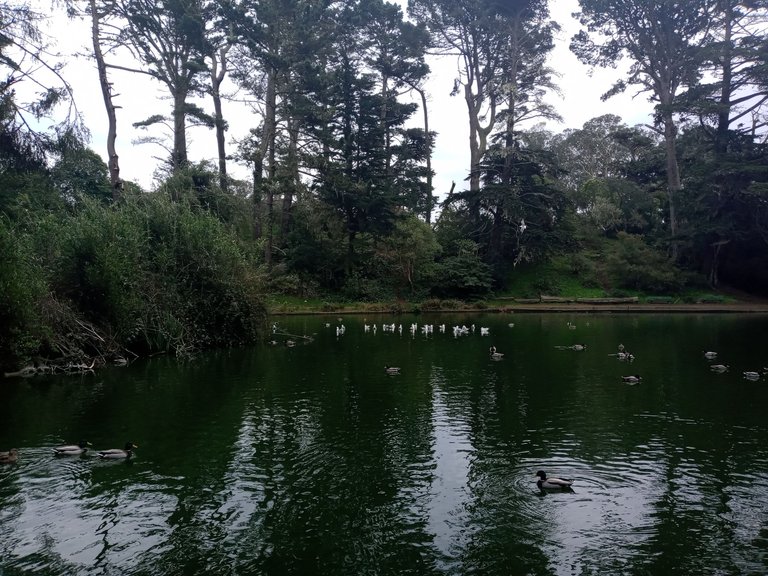
It would have been the stuff of legends if reported in the 12th century like this: King Marke was so rich he had a bay dredged out and filled with emeralds and silver. But if he were your friend, you knew his imagination outstripped the fortune seekers of his age.
"When first I saw it I thought instantly of the bow of emerald around the throne of God, reflecting off the sea of glass before that throne ... awe so overtook me that I knelt and removed my crown at just this pale reflection of that scene."
So on his map, it was marked Humility Cove, and it was his personal port of return, a reminder of that Throne before which he was merely an humble servant. He had left most of it in its natural state, so whatever the stresses of the journey may have been, one walked away from them through a scene of wonderful peace and reflection before ascending to either his nearby summer palace or to the main road.
Photo by the author, Deeann D. Mathews at Lloyd Lake, February 16, 2024
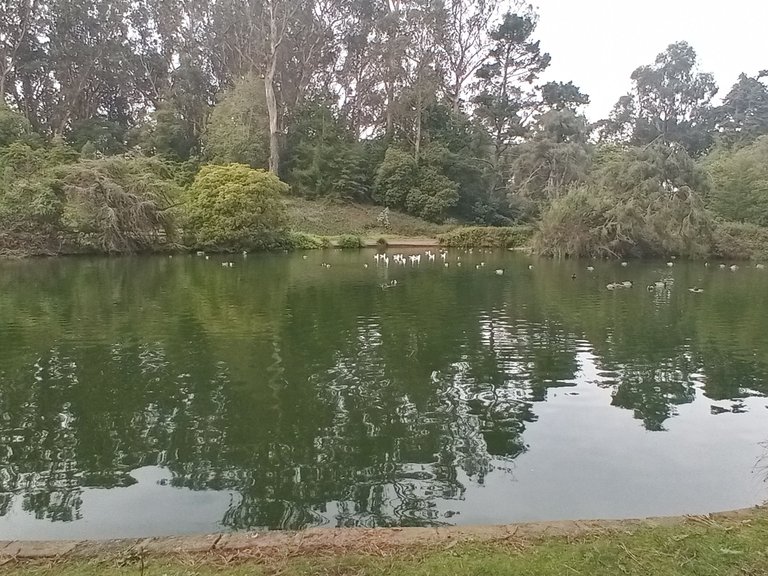
As I expected, the Ghost of Musical Greatness Past was reprising his role as King Marke – thus he was a giant in 12th-century terms, six-feet-two and and broad and deep to match, in his early fifties but white-haired, giving him a greater appearance of age. Yet the head was well-made and looked well with full hair and beard, and his heavy crown of gold befit him well. He cut a magnificent figure in his burgundy tunic and winter mantle of sable held around his powerful neck with a clasp of gold and a ruby of the deepest, clearest red. His eyes also were clear and bright, alert, and deep. His mind was sharp, and already focused on what he had written to me: “Make all due diligence to come to me … here I can fully protect you.”
I was wearing the traditional dress of an Ethiopian queen of that time: fine white linen, embroidered with broad edges of gold and blue befitting my royal status, a royal head wrap of the same make atop my head. There were enough layers of all this that I did not feel cold, but because my royal host knew the nature of his winters, one of the members of his retinue met mine before I even made it to the ramp to come to shore.
“The gift of His Majesty to Her Majesty, in humble gratitude for her brave determination to come to his land in winter.”
So before I ever touched the soil of Cornwall, he had made known to me his idea of protection: a pure white ermine cloak and sable-trimmed leather boots, with clasps on all made with sapphires and gold to match the royal edges of my dress. Today, that would be around $150,000 worth of a gift, just to keep a queen color-coordinated and warm. He also had covered me politically, clearly positioning me as his equal and to be treated as such in Cornwall.
Of course, royal appearances and conversations in public are always political: greetings, salutations, the royal exchange of gifts that he, as host, had already begun and I would answer later; formal discussion of the purpose and parameters of my visit, and how he intended to accommodate me at once and over the duration of my open-ended stay. And, I could already see why the man who famously portrayed him said he had to be careful doing so, because King Marke could put you right to sleep. Talking while walking with him in conversation was helpful!
Yet if you yourself were mature in great responsibility, you would understand King Marke … his manner suggested the Pacific Ocean, the biggest and deepest of Earth's waters, more things in motion and at rest within it than any but its Creator could ever know … yet it is never covered to any extent by a single storm, or bottlenecked between any continent. It has its storms, but its default, come what may, is peace.
Yet even today, with all our modern technology, there is no journey more dangerous on Earth than to cross the Pacific unprepared, for if you get lost in it, truly you are lost. As it would in any century, it will fold you into its peaceful blue like you never lived and roll on, completely undisturbed. That was the kind of consideration one had to make of the character of King Marke, living any significant length of time beyond the close of the curtain on Tristan und Isolde. Wagner stopped where he did for a very good reason. People who love folly do not like to be reminded of the greater and prosperous longevity from which the folly they love disqualifies them.
Yet for those looking for that grant of life after their own tragedies, meeting such a character was quite an experience. His conversation filled my spirit with peace, and it came naturally to reciprocate in kind. Now he had reopened his summer palace for the duration of the halcyon, and he had a sumptuous feast prepared that reminded me that he had boldly enjoyed the food of Ethiopia and remembered what it ought to taste like … we were surprised to meet our staples fuul and injera reasonably approximated along with the best of Cornwall's fare … but to me, the conversation was the feast. I might have talked with him until dawn, but I had to think of my own retinue, tired after our long journey, and keep the peace there … but that was no hardship, for peace lends itself naturally to rest.
Photo by the author, Deeann D. Mathews at Lloyd Lake, February 16, 2024
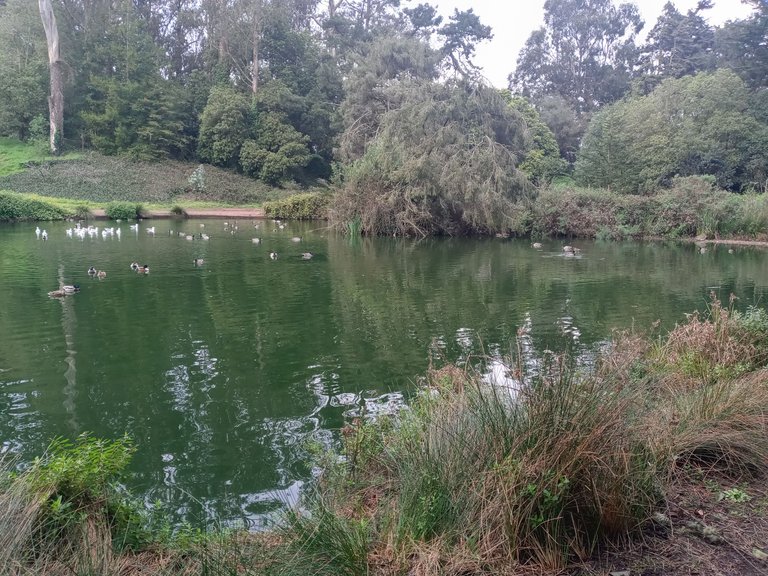
King Marke was a firm, judicious, and clement ruler, and a masterful administrator of government. He valued wise counsel, clear information, and personal study of all matters presented to him. He gave clear, well-considered orders, and took full responsibility for all outcomes in his purview, good or bad. No one in his court was afraid of being made the scapegoat, and no one in his court feared not receiving proper credit.
The Peacemaker killed no messengers and heard no flatterers. He was slow to anger, and never made decisions while his emotions were high in any direction. If there were a bad report, he investigated carefully. No one had been surprised in his court that, even after the deep dishonor done him by his heir and wife, he had given Lady Brangäne time to come to him with the truth.
In the interim since Prince Tristan's death, King Marke had firmly settled the question of the succession. His six designees from among his knights and admirals were with the king focused on the one thing, which was to maintain the peace and prosperity of Cornwall in a manner that God would continue to bless. Every day of the week he handed the remaining business of the court over to one of them in the afternoon, and departed with this benediction: “Blessed are the peacemakers, for they shall be called the children of God.” Hence his own personal appellation, given to him by one who heard and was moved by the deep, sincere reverence with which the king always blessed his court.
Tristan and Isolde – who were they? Cornwall never missed them. Only if you were permitted to follow the king from the court on his quiet days could you know what he had locked within the depths of his heart and so kept from troubling Cornwall.
Photo by the author, Deeann D. Mathews at Spreckels Lake, February 21, 2024
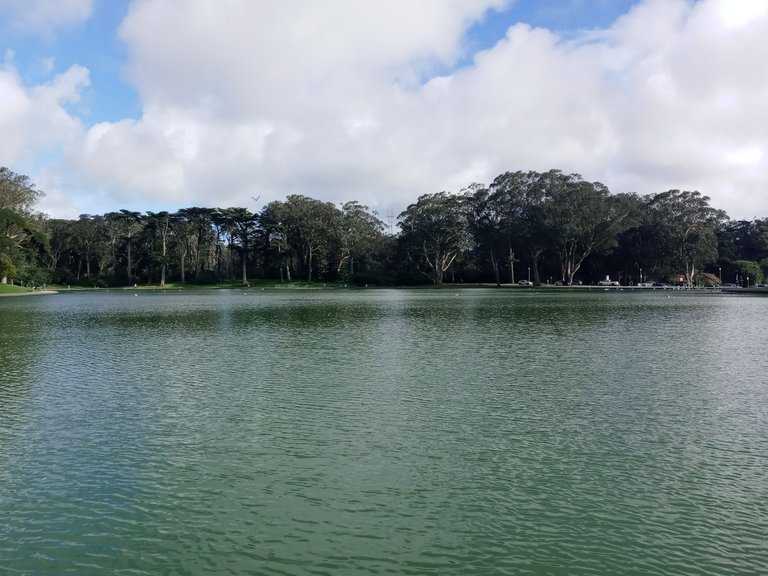
Only after I had been presented at court and the record of my solo reign and that of my husband before me read into Cornwall's records was I officially invited into King Marke's afternoons in which he walked instead of riding, hunting, or training with his knights. There were some displeased with this, but their spies were bored to sleep quite quickly, for my contralto harmony fit right in on “dull” matters of philosophy, wisdom, and faith. I was quickly judged as no threat to stealing the king's heart, although …
“They really are concerned more about my body and emotions, and whether they can be manipulated,” he said. “Few know anything about my heart, but in fairness, I am not the easiest man to know.”
“In a time of rituals of pride and prejudice,” I said, “it is hard to be known except as one fits in with another's performance of the rituals.”
“I was a fifth-born son,” he said, with a smile. “No one even bothered to convince me of the necessity of fitting in, and I am now too old to learn.”
“And still completely uninterested,” I said.
“Yes,” he said, and smiled more, but then a cloud passed over his face before he said, “I have learned, with the years, that whenever I have tried to adjust myself to the performance needs of others, my chastening is swift and sure. Even a king may not do all things, for the King of Kings is over him.”
That was the first hint as to his viewpoint on what had happened with Tristan and Isolde.
King Marke did not often have much to say; I could tell more of his mood by where he chose to walk and stop, and gaze. Quite often we explored the upper parts of Humility Cove and along the river back of it.
Photo by the author, Deeann D. Mathews at Lloyd Lake, February 16, 2024
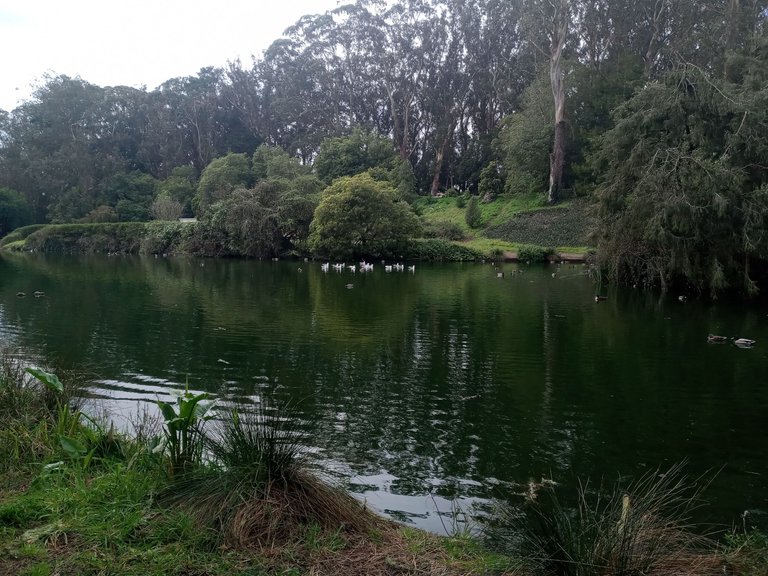
Often he delighted to surprise me with an early herald of the coming spring, by which he called a halt so we might rest and refresh ourselves.
Photo by the author, Deeann D. Mathews, in the streets of San Francisco, February 12, 2024
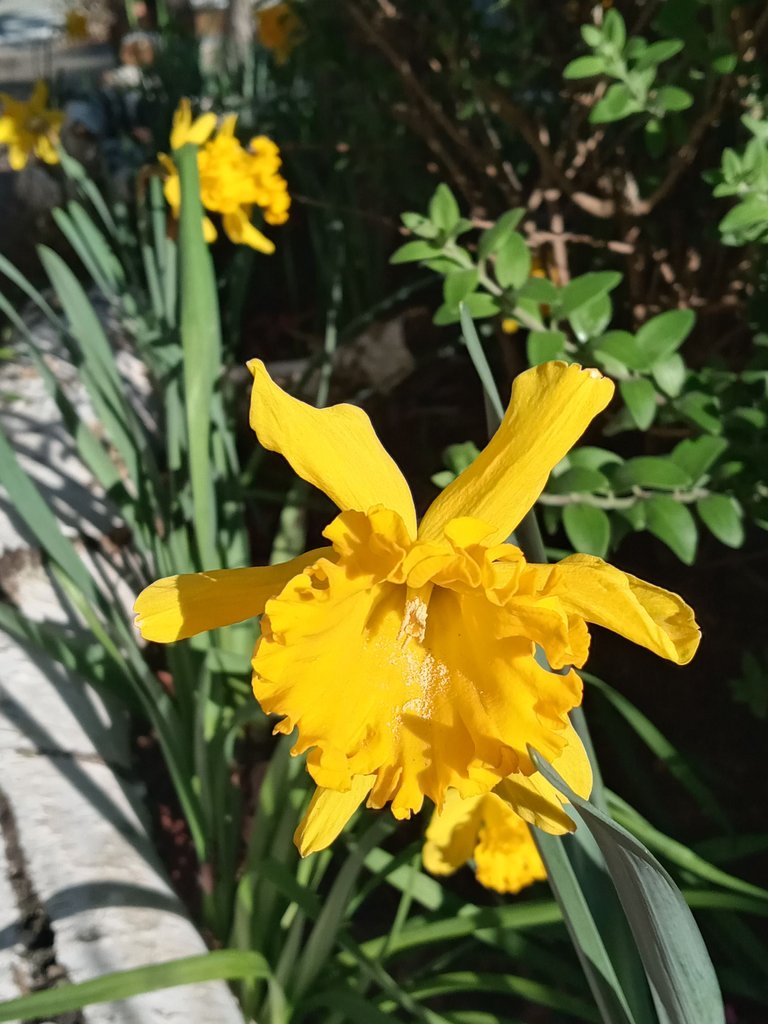
Often in seated view of these places – though not mine directly; he was much taller, and only when I stood up could I track his gaze – were spots where winter had done its very worst, and yet the coming spring asserted itself anyhow. By that I knew the general set of the king's mind.
Photo by the author, Deeann D. Mathews at Spreckels Lake, February 21, 2024
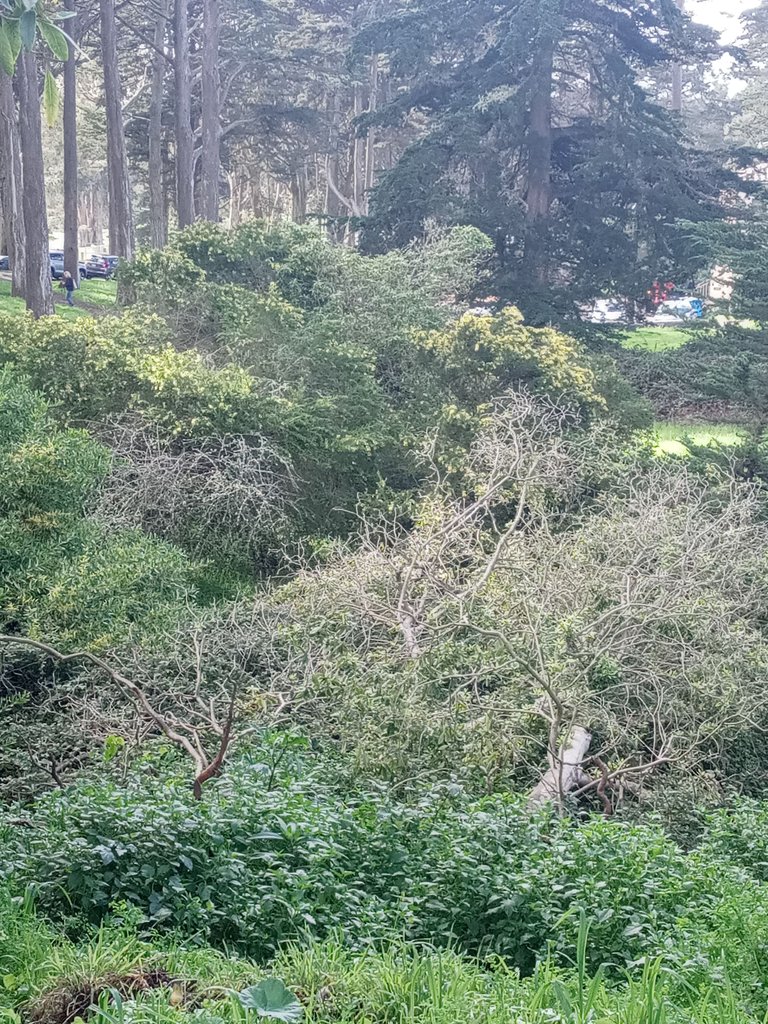
On one occasion on a turn in the riverbank, we looked up and found two trees growing into each other:
Photo by the author, Deeann D. Mathews at Spreckels Lake, February 21, 2024
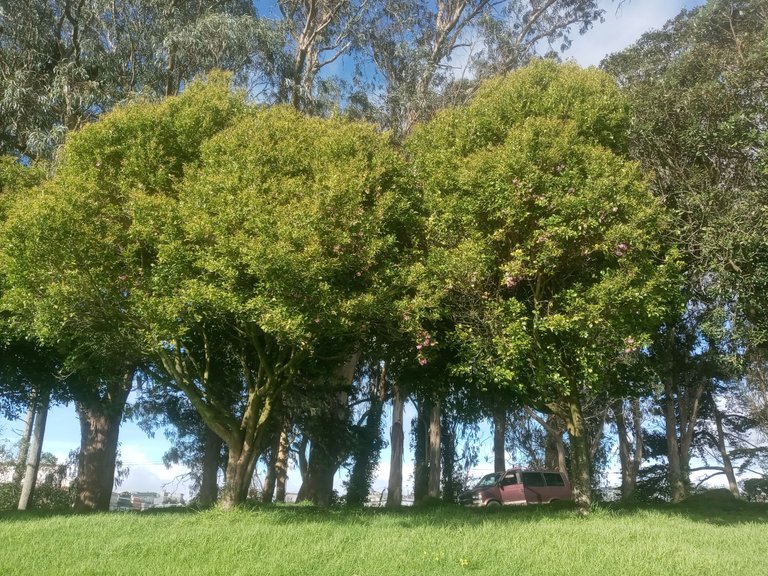
This startled the king, and anguish passed across his face before it settled again into sorrow, and then sorrowful calm. As we walked on, I told King Marke what my chief historian had told me about the two trees that had grown together over Tristan and Isolde's graves, and how two branches had fused and grown a fruit for him. He looked at me, then looked ahead of him, and then spoke in an even, sad tone.
“Trees are innocent … who would begrudge them, against the wind, meeting and touching one another and finding in each other such support as they may, when to fall is to die? And sometimes, people, finding each other, do not intend the harm they do in trying to do the same.”
Truly he had understood and forgiven his nephew and his wife, yet at a high cost.
“About that fruit – I gave it to Isolde's parents and Lady Brangäne, for it was not forbidden to them. But to me, it was the deadliest of poisons, for both Tristan and Isolde in their poisoned state thought it best to choose death for love, but I, of sober mind and divinely granted responsibility, must always choose life for love's sake. I therefore can partake of nothing their love-death would offer me.
“Yet on nights when the rain weeps and the wind moans, I dream of that place where their trees are, and of a third tree rising there, to stand before the wind and prevent it from visiting them too roughly … a tree great, and high, and strong, but barren."
He paused, and then added, "Then I wake, always ... called awake ... for the Voice that called me to forgiveness called me that far, but no farther. Day by day, night after night, it is that simple."
"And that hard," I said.
"Yes," he said. "It is so hard I feel the weight of it on my chest, wanting to collapse that empty space where the parts of my heart were that are now buried forever with my loves. They would have welcomed me uniting my heart there with them forever. I understand, but I also understand their end is forbidden to me. What my end will be, I am not permitted to know. I am commanded and given strength to walk to it. I ask for no more, for I can bear no more, and live. I bear no grudge. I do not complain."
We neared then to a place where the shade of many trees met ...
Photo by the author, Deeann D. Mathews at Spreckels Lake, February 21, 2024
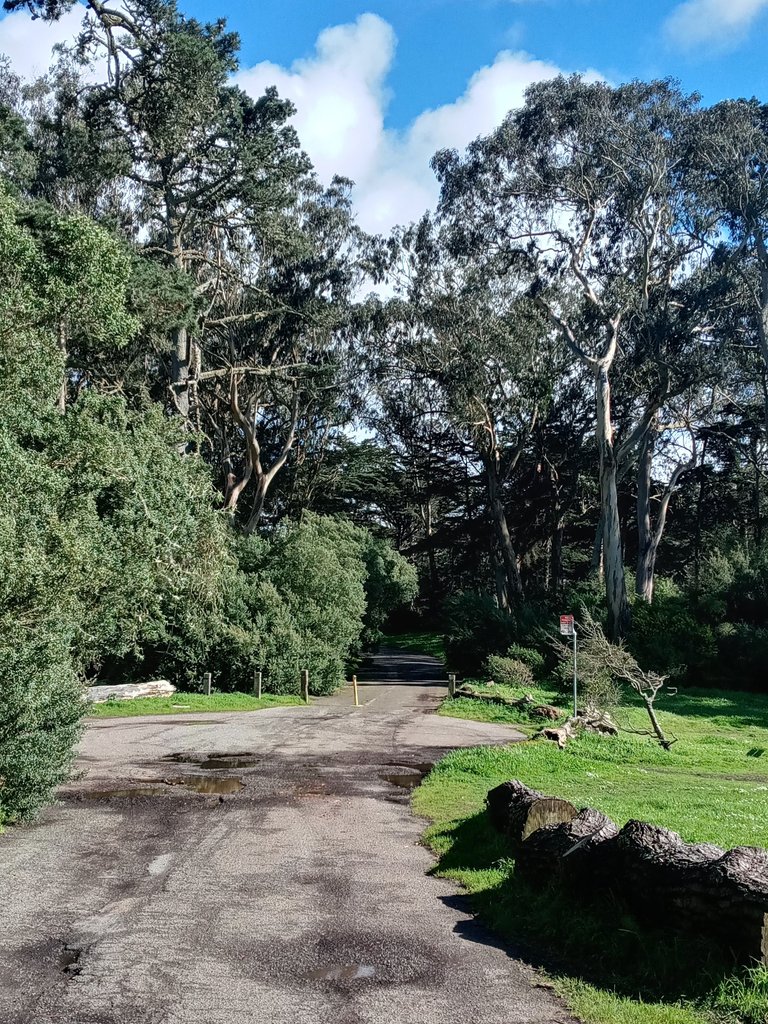
I do not know who reached first for the other, but like two aging trees in a windy world, our arms went around each other the moment we were out of sight. His heart was pounding so hard I could feel it, but in a place in which another man would have cried or died, he sang ... a song of complete love and heartbreak and understanding ... he knew the "serpent" ... evil ... had intruded, and that his beloveds, caught unaware, had been helpless ... he knew that his love, great as it was, had no force to penetrate the darkness that had now fallen ... and yet, in refusing grudge or complaint, in acceptance, he yet kept the peace ...
The great baritone Jose van Dam, appropriately aged and in heartbreakingly fine form, singing Schumann's “Ich Grolle Nicht”!
After this we stepped out into a place of serene sunshine, the clouds having passed over...
Photo by the author, Deeann D. Mathews at Spreckels Lake, February 21, 2024
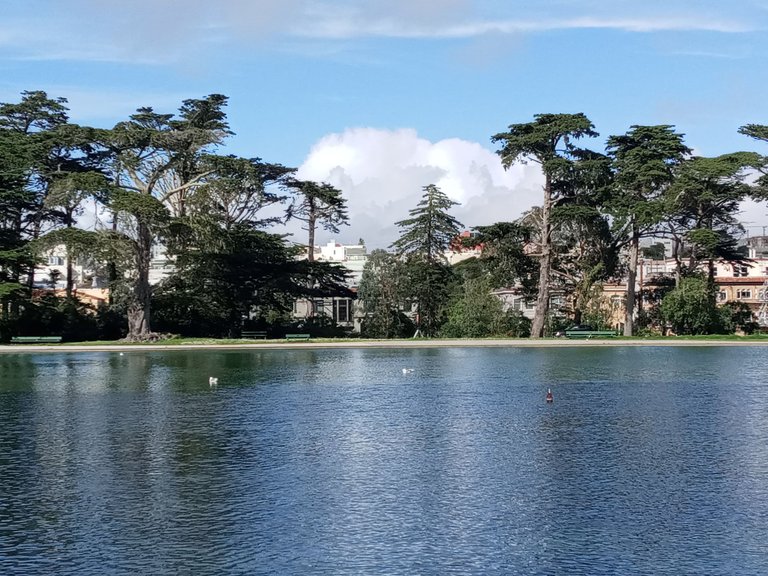
... the tears on our faces kissed by the sun and drying in the gentle breeze. All was peace. The choosing of acceptance, the humility to keep moving forward without assurance of happiness ahead because of faith in the One Who called, and the refusal of the burden of a grudge – all those things made for the keeping of the peace. Now, King Marke was a passionate man – that had not come easily to him – but he was called the Peacemaker for a very good reason: he made peace where it would not otherwise exist. He had begun with himself, and his losses, and had just spread the peace out from there. Cornwall and 20 nations now related as placidly and purposefully as the scene before us. So, in peace there was power – great power, often overlooked.
Yet I then recalled with I had seen in King Marke's court; he did not have a scepter of gold, or silver. The Peacemaker gripped a rod of iron. That also told me where his thoughts were … for it was written in the Scripture that the Prince of Peace Himself, having made peace on the earth, would rule with a rod of iron. As the prophecy ran, after 1,000 years of peace, evil would rise again … it was still there all the while, occasionally trying its strength … hence the need for an iron rod. That told me all was not entirely well with Cornwall and its allies.
Now in King Marke's specific case, I noted; he kept his scepter always in one hand, then another. Perhaps that also was the secret of his reportedly unbroken serenity at court: his scepter was heavy, and the concentration necessary to keep it moving and off the ground helped take his mind off other things. But also in plain sight, he was quietly and steadily retaining his arm and grip strength.
I had also heard that from my guards invited to keep up their fitness with his knights in riding and hunting and sparring: “The Peacemaker is not nearly so old or weak as he has been made out to be, and can be ferocious. He who would challenge him unaware makes a great mistake.”
The captain of my guard had gone further: “King Marke is biding his time and using his deep anger productively, but there is an evil day ahead for someone presently beyond his reach. Woe be to that one when he comes within the length of the king's Welsh glaive or two-handed greatsword, or, even more terrible, the grip of his mind, for on that day, that one shall know King Marke can do what he wishes with his anger.”
"That one" came within reach soon enough. King Marke received a letter just as we were leaving for our walk one day, and saved it until we had stopped to rest for a time. His face darkened with anger upon reading it.
“Marke,” I said, and reached over and took his hand, for I could see the veins pounding in his neck.
“Thank God that you are here, and I can feast my eyes upon you,” he said. “You are so lovely today that the sun has been following you all along this shore –
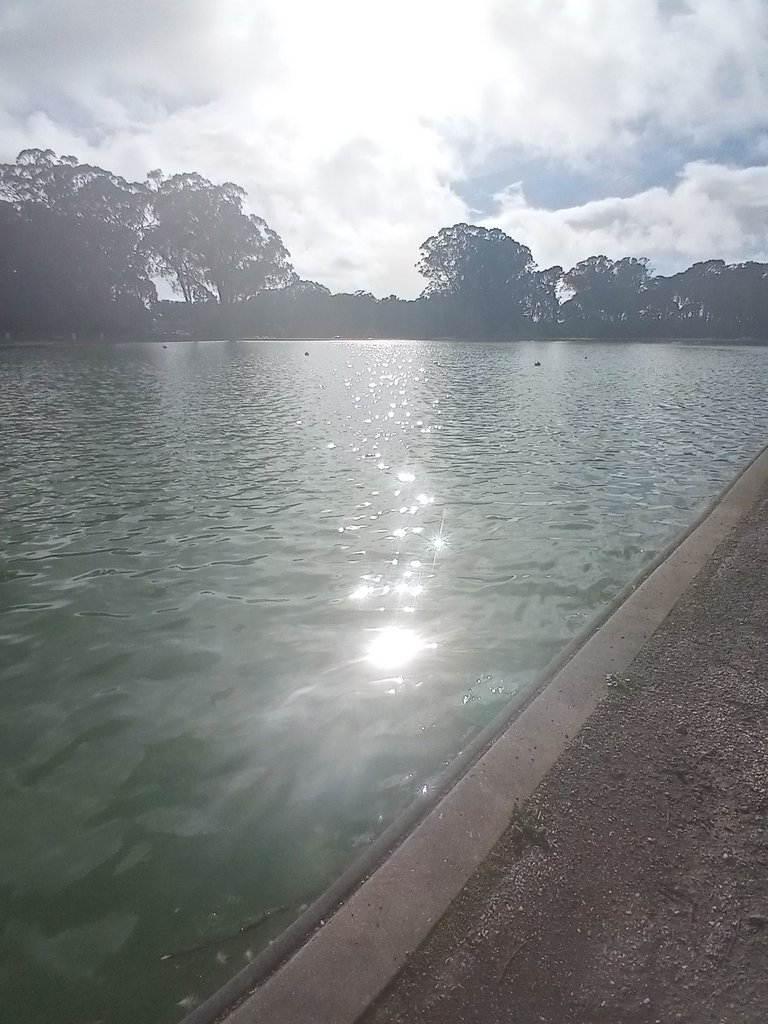
– “and if I worshiped the Greek gods I would have to be worried, for I am just a little fifth-born son looking upon a queen the sun is looking upon and admiring, and has kissed already … but the grace of God permits a little Christian fifth-born son to be in the presence of a queen.”
“Oh, Marke, stop,” I said, and we laughed, and the veins in his neck settled back down ... but it was a good while before he spoke.
“I prayed for clarity," he said, “and here I have the answer -- there is no repentance, so there shall be no forgiveness, and no mercy beyond what is necessary for the sake of Cornwall's peace!"
“Who dares offend to that degree, if you could forgive Tristan and Isolde?”
“My erstwhile in-laws – their Majesties Sean and Iseualt of Eire,” he said.
“My chief historian gave me the impression that you parted from them on good terms,” I said.
“Your chief historian is right,” he said, “because I am commanded, 'be at peace with all, so far as it lies with you.' But it was the greatest personal struggle of my life. Who, may I ask you, authorized those potions being put on my ship?"
“Oh, no,” I said.
“From the day Tristan selected Isolde, out of that court, Tristan and Isolde were dead. It was just a matter of time, because no one can serve two masters!
“King Sean has written me the most Christian-themed letter imaginable about the most abominable idea, and he knows his queen does magic arts and meddles in world affairs in that way. He knows they would have had utter control of me, and Cornwall, had that love-potion been given me – and it would have been worse for me than Tristan, although to be fair, that part was not understood!”
He sat down again.
“You have known of me almost 25 years,” he said, “and you have known me since we met in Jerusalem 18 years ago. Do I strike you as the type of man who needs magic to be moved to love?”
“By no means,” I said.
“I wrote to them – I made an effort that they should know the heart of the man who was to be the husband of their daughter!” he said. “Do you know they never wrote back, or even showed the letter to Isolde? Lady Brangäne found it and did some research, which is why she was able to tell Isolde good things about me! But poor Isolde … poor Isolde!
“Oh, my Isolde, though never mine! I had determined in my heart that I would love my second queen, and when I first met her, I thanked God my way had been made easy. I was dazzled by her beauty, her strength, her wit – I enjoyed her company and conversation!
“But on our wedding night I could see that she was terrified, and that aroused in me a stronger desire than for her body. I had banished fear of me from Melder's life, after her third miscarriage, and that had opened up a world of love between us that few have ever known … the memory of that love, and the thought that I might bring Isolde to know it, overcame everything else. So I told her she was my wife, and mine forever to love. I would give her time to get to know me, and I would win her love and trust. She was so relieved, and I was content, for deep in my heart I knew I had just given her the greatest gift of love I could … until I was given the strength to forgive her.”
“You also covered her by choosing to report only 'accidental poisoning.'” I said.
“She was my queen,” he said. “Her body was never mine, but her reputation is – and I will protect her, as I did Melder. There shall be that much mercy also: I loved Isolde, and I will protect her, come what may.”
“Marke,” I said, “by the path of true love, you have had a very narrow escape. Isolde believed in the potions as well, and was going to kill herself and Tristan if Lady Brangäne had not made the swap. She still had that death-potion, Marke, all that time. Because you showed her true, protecting love, you have lived to be her widower.”
The king dropped his great voice to the bottom.
"I know."
Photo by the author, Deeann D. Mathews at Spreckels Lake, February 21, 2024
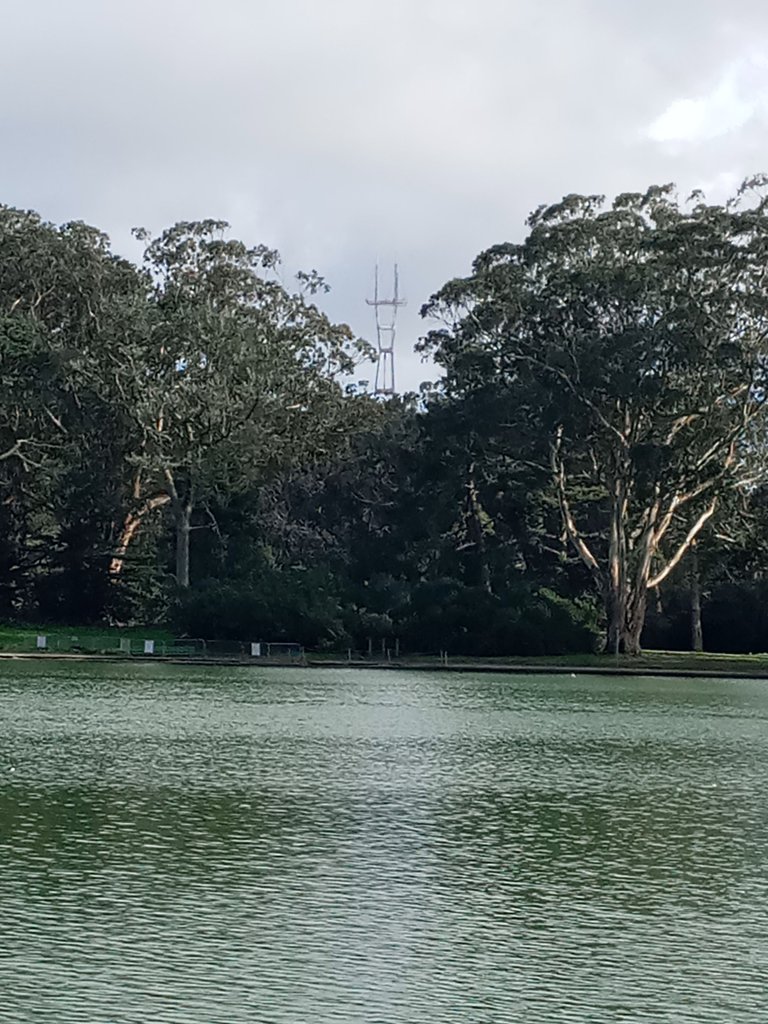
As the clouds gathered again over the sun, King Marke rose, his anger and his resolve seeming to blend into the energy of the coming storm ... and again he sang, the song of a man in autumn where he had been in spring, but loss and death come where love and life had gone so quickly by, under skies empty of color and life and leaving him feeling almost lost … over the heath, if not by the water...
The one and only Kurt Mōll again in gorgeously DEVASTATING form, singing Brahms 'Über die Heide' as part of his collection of ten songs by Brahms that I am slowly working through! I have timestamped the starting place (5:52, just in case), but you are welcome to enjoy it all!
Almost lost – almost, as he had been tempted to be with his own encounter with the forbidden fruit – but not. Again, King Marke gathered himself, and led me by a shorter path from the peace of Humility Cove, passing by the great waterfall that towered over us, but in whose pool the king had sunk great stones so there might be a place to view it and then pass over to the other bank of the river:
Photo by the author, Deeann D. Mathews at Lloyd Lake, February 16, 2024
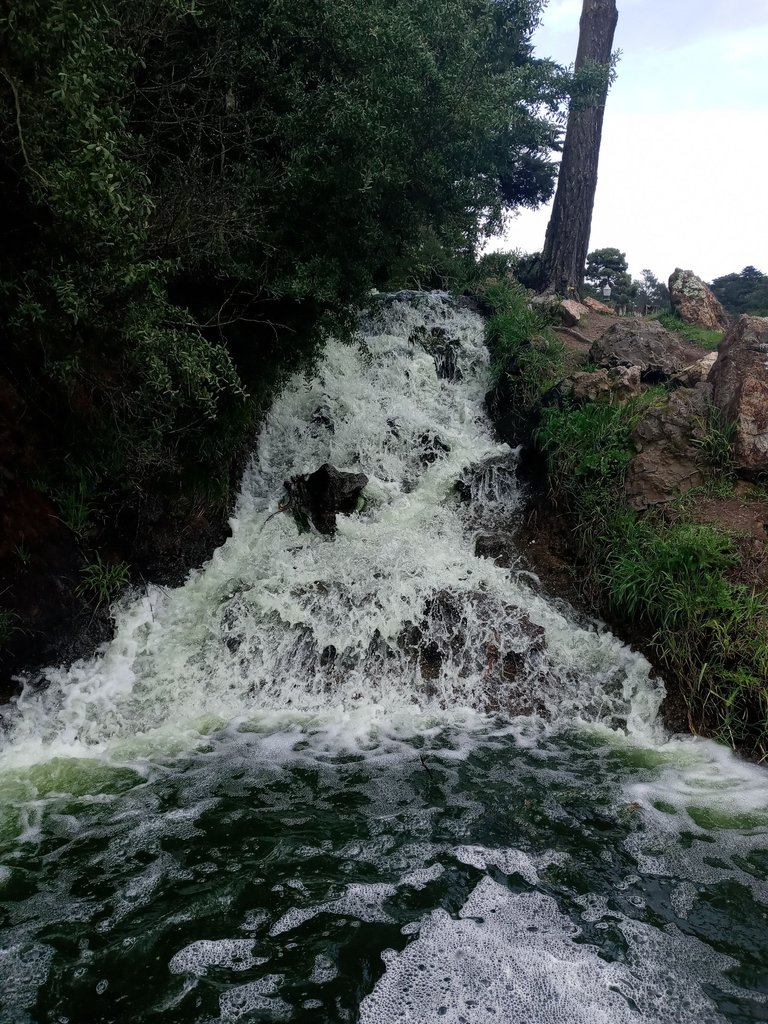
Upward still, and then by horse to his main castle, where I had not yet stayed because the king had opened his summer palace to me for the duration of halcyon. Not to his main court, but to the level of his personal residence … and to a room there with the door locked with a great golden lock, the lock adorned with a black rose someone had quite artistically made.
“I am thought of as a sentimental, weakening old man,” he said, “and I contradicted no one about it when I ordered that Queen Isolde's room be shut up, the things I gave her and her own belongings likewise unmoved. This room here … that I never entered without asking if I might, and was never refused … when I asked, she would come out with me to the cove. For her I put down the stones in the waterfall pool, for she liked that place. She liked the path by the waterfall to go down to our royal sailboat, and she liked, once, when it was suddenly more cold than we expected while sailing, that I took her into my arms and kept her from that cold. She liked that I would walk her to this door, and kiss her forehead, and bid her goodbye until suppertime … and so, from here, she never brought forth what she could have … .”
The king had preserved the evidence of a once and present poison plot against him. That was what it was, for when we entered, and searched, we found the death-potion, hidden in almost plain sight among the queen's perfumes, in her hand's reach at all times. But it had a layer of dust on it even thicker than most of the things in the room. She had never once moved it from the spot where she had put it.
“She never felt she needed to,” I said. “Queen Isolde did love you, Marke, as much as she could – she responded to your love, and never tried to hurt you.”
We checked, of course – a drop of that potion, in milk, left every gallant fly who thought it was spring to never have to face winter again. Each died instantly, and sank into the milk.
When he saw that, King Marke shuddered, and had to walk out of the room for a long moment. I came and put my arms around him, for I could hear his heart thundering, and I remembered that my chief historian had said how it was not long after he had refused the forbidden fruit and left the place of those trees behind that he had collapsed. He was in his early fifties – prime heart attack territory, as we know today. He Who had calmed the storm to get the king safely home had likewise calmed his heart, and so now …
“My angel,” the king said to me, “if ever I needed the comfort of a loyal friend, it is now. Thank you.”
At length, a strange smile came over his face.
“You know that while I was still just fifth-born son,” he said, “I had time to master many arts. I draw well, still.”
“I know – I so cherish the drawings you made of King Tarhakaa and me when we were last all at Jerusalem, and our last time all together in Ethiopia,” I said.
King Marke then ordered pen, parchment, and paper to be brought to him, and then he went with me back into that room and made one drawing and then a second of the potion, the milk, and the dead flies in it. The vividness of those, to me, took greater force because I saw the breaks he had to take for anger and anguish. He had to leave the room periodically, and again I would hold him – for love was life, and the margin was narrow for him. Yet it was enough: he completed his drawings, put the potion back where we had found it, and cast the whole dish with the poisoned milk into the moat, far below.
“That ought to keep the mosquitoes down,” he said.
“Indeed it should,” I said.
Then he sat down, took his ink and finer paper, and wrote a royal letter.
“The advantage of one great Holy Roman Empire,” he said during a pause in writing, “or at least, the idea of it, is that we have a pope, and the present pope takes a dim view of un-Christian meddling in political affairs in Europe. Christian meddling? That's all right. He does a fair bit of that himself. But magic? Oh, no. He does not like that. He will have you thrown from your throne for that. So then since King Sean has offered me, in his letter, my choice of his remaining three lovely daughters, and since he has not repented of attempting to use his wife's magic arts to have my late wife be able to poison me, and since he has four daughters in the royal houses of Europe already … .”
“Oh,” I said.
“Your mind,” he said, “is a lot quicker than King Sean's, but then, your husband and I already have had that conversation … as Christians, we rely on the will of God, and do not take to ourselves any attempt to manipulate matters to our will. There is nothing more evil in pagan or foreign magic than there is to lie, or to deceive – it is all the same sin of seeking to usurp God's rule over other hearts, other lives. While as king I can command my knights and captains here and there, I have no right to turn their souls about by force, or to take their life if they have not broken the laws of the land. I am king, but I am just a man. King Sean and Queen Iseualt have forgotten their place.”
“And you are going to remind them,” I said.
“Firmly,” he said, “with a copy of my letter and that second drawing also going to the pope. Now, I can recall my messenger who will leave for the Vatican the same day I send this letter and drawing to Eire … that messenger will be ordered to take his time … but if I do not like my erstwhile in-laws' answer, he will already be on his way. This wickedness shall have an end, now.”
It is said that when that letter and the drawing that came with it was received in the court of Eire, King Sean turned as pale as a ghost, and Queen Iseualt actually fainted. Thus they knew that they had been quietly defeated in their aim to master Cornwall and other nations in the alliance of 20. There would never be another “accidental poisoning.” King Sean wrote his promise on the subject to King Marke, who recalled his slow messenger to the Vatican … but of course retained all the evidence, and so that was the end of that.
So, without a drop of bloodshed, the Peacemaker had defended the alliance, and was victorious. I knew then that, so long as he walked in the way he was walking, he would ever be victorious, though trials would continue to pass over him like the storms come and go. For as it is written:
Blessed are they which mourn, for they shall be comforted. Blessed are they which do hunger and thirst after righteousness, for they shall be filled. Blessed are the merciful, for they shall obtain mercy. Blessed are the peacemakers, for they shall be called the children of God.
Photo by the author, Deeann D. Mathews at Spreckels Lake, February 21, 2024
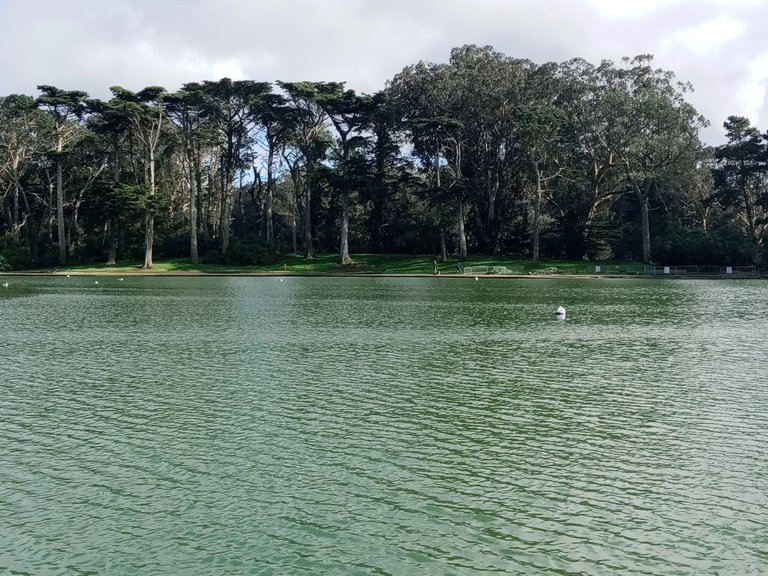
One day, I quoted that to King Marke as we sat again upon the shore of Humility Cove, and he burst into silent tears.
“He Who promised is faithful, and has done for me what was needed for the comfort of my heart,” he said. “Now our allied lands shall now live in deeper peace, the evil removed from among us, and no one else shall have to know my grief … oh, my Tristan, and my Isolde … how I loved you … but now … now I shall rest in peace!”
Then, he smiled, and we rose, and embraced.
“My friend, thank you for coming to see about me,” he said.
“Now you know I had to do that when I heard that lament,” I said, “but now, I shall take what I have learned, and share in the peace as well.”
He walked me around to the portal …
Photo by the author, Deeann D. Mathews at Lloyd Lake, February 16, 2024
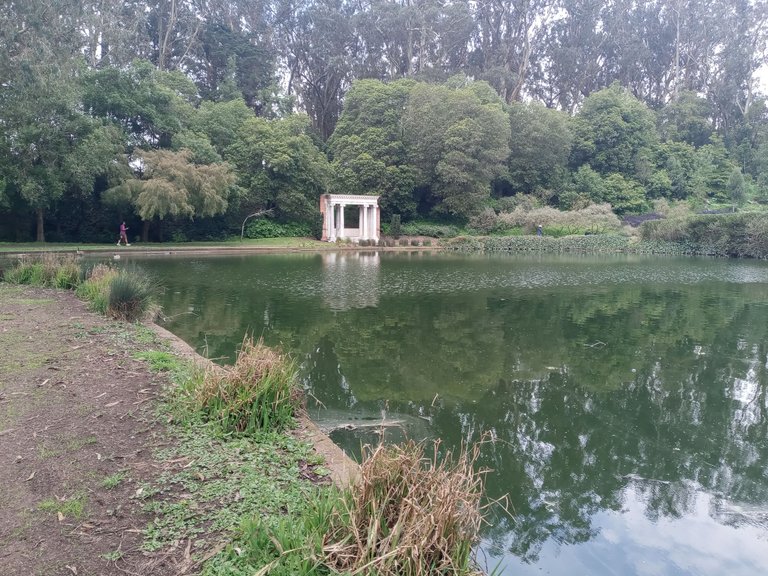
… and made sure I stepped up safely, and kissed me on my forehead before I traveled down the nine centuries back to our own.
When I arrived, children were playing on the banks of Lloyd Lake …
Photo by the author, Deeann D. Mathews at Lloyd Lake, February 16, 2024
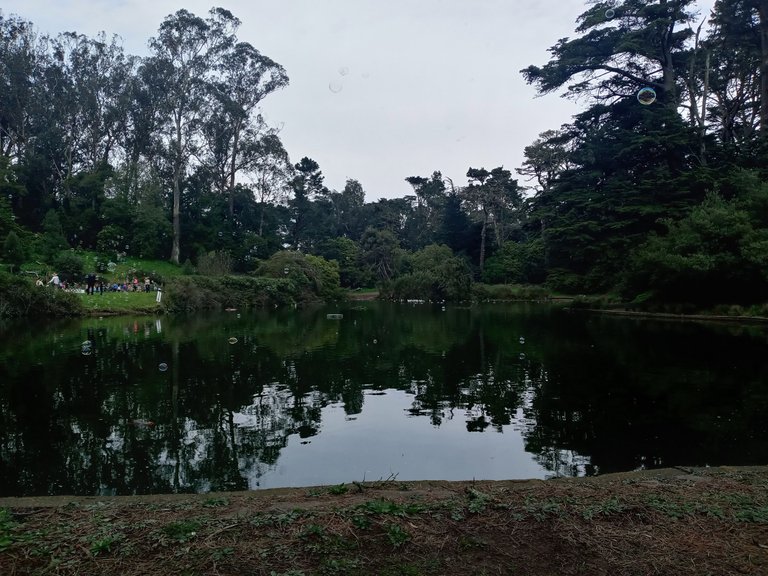
… and I felt all that hopefulness and joy too, my own personal questions answered … I had seen for myself in a picture that He Who had promised was faithful. It could not otherwise be … so though I have mourned much in 2022 and 2023, I know that I shall be comforted … as this new spring approaches, I look forward with hope, and walk in faith, attending to all the right I know … because it cannot otherwise be!